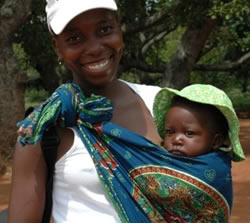With the support of PMI and partners such as the Malaria Consortium, the National Malaria Control Program has used a variety of methods to raise awareness about the free mosquito net distribution for pregnant women at antenatal clinics.

Pregnant women and children under five in Mozambique are most vulnerable to malaria. Source: Bita Rodrigues/USAID
Isabelle is five months pregnant, and it is her second visit to her local health unit, a 20-kilometer walk from her remote village, located in the rural district of Monapo. “I left home before the sun came up to get here for my consultation.” She concedes she might not have made the effort for that first trip, if she hadn’t heard of the free distribution of mosquito nets for pregnant women. “I had heard about the nets,” she says. “I hoped to receive one.” Asked whether she would have asked if she was not given one, Isabelle smiles coyly, “No, I wouldn’t be able to ask.”
She was given a mosquito net during that first visit, and she says she is using it. She explains clearly in Macua why insecticide-treated mosquito nets prevent malaria and the dangers of malaria especially to pregnant women and infants.
With the support of PMI and partners such as the Malaria Consortium, the National Malaria Control Program has used a variety of methods to raise awareness about the free mosquito net distribution for pregnant women at antenatal clinics. Due to high illiteracy levels, messages are most effectively transmitted through word of mouth, radio, or visual tools, such as flip charts, which are used by nurses who have been specially trained on malaria control at the antenatal clinics. Ansha Lurdes, the nurse at the health center that Isabelle attends, says that the pregnant women who come to the center,“all know about the nets and most of them will ask for them.”
The challenge is to access even more women living in remote areas, like Isabelle. A team from the health center goes out in a mobile unit three times a week to reach communities that are up to 90 kilometers away from the center. It is not an easy journey. Of the 21 districts in Nampula, only three are accessible by tarred roads, points out Armando Matos, the assistant program officer in Nampula for the Malaria Consortium. “Most of the roads are very bad dirt roads.”
The mosquito nets are a proven tool in the fight against malaria control and could drastically reduce the high mortality rates in women and children in Mozambique. Each year, more than 400 out of every 100,000 pregnant women die due to complications during childbirth. More children die of malaria in Mozambique than of any other disease, accounting for 60 percent of the child pediatric hospital admissions and 35 percent of hospital deaths.
Isabelle heard about the mosquito net distribution during a talk given by a health worker in her remote community. She is convinced of the importance of the net. Although she and her husband are subsistence farmers and have little income to spend, she now values her mosquito net and says,“I don’t want to be without a net now.”
